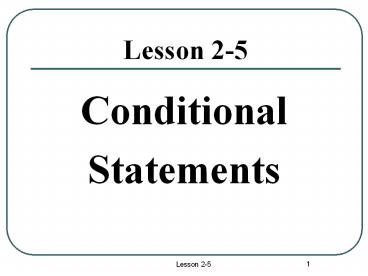Conditional - PowerPoint PPT Presentation
Title:
Conditional
Description:
Conditional Statements Conditional Statement Conditional Statement - continued Conditional Statements have two parts: ... If the hypothesis of the first occurs, ... – PowerPoint PPT presentation
Number of Views:227
Avg rating:3.0/5.0
Title: Conditional
1
Lesson 2-5
- Conditional
- Statements
2
Conditional Statement
Definition
A conditional statement is a statement that can
be written in if-then form. If _____________,
then ______________.
Example
If your feet smell and your nose runs, then
you're built upside down.
Continued
3
Conditional Statement - continued
- Conditional Statements have two parts
The hypothesis is the part of a conditional
statement that follows if (when written in
if-then form.)
The hypothesis is the given information, or the
condition.
The conclusion is the part of an if-then
statement that follows then (when written in
if-then form.)
The conclusion is the result of the given
information.
4
Conditional statements can be written in
if-then form to emphasize which part is the
hypothesis and which is the conclusion.
Writing Conditional Statements
Hint Turn the subject into the hypothesis.
Example 1
Vertical angles are congruent.
can be written as...
Conditional Statement
If two angles are vertical, then they are
congruent.
Example 2
Seals swim.
can be written as...
Conditional Statement
If an animal is a seal, then it swims.
5
If Then vs. Implies
Another way of writing an if-then statement is
using the word implies.
If two angles are vertical, then they are
congruent.
- Two angles are vertical implies they are
congruent.
6
Conditional Statements can be true or false
- A conditional statement is false only when the
hypothesis is true, but the conclusion is false.
- A counterexample is an example used to show that
a statement is not always true and therefore
false.
If you live in N.C., then you live in Raleigh.
Statement
Yes !!!
Is there a counterexample?
Counterexample
I live in NC, BUT I live in Kernersville.
Therefore (?) the statement is false.
7
Forms of Conditional Statements
- Converse Switch the hypothesis and conclusion
- If two angles are vertical, then they are
congruent. - If two angles are congruent, then they are
vertical.
Continued..
8
Forms of Conditional Statements
- Inverse State the opposite of both the
hypothesis and conclusion. - If two angles are vertical, then they are
congruent. - If two angles are not vertical, then they are
not congruent.
9
Forms of Conditional Statements
- Contrapositive Switch the hypothesis and
conclusion and state their opposites. - If two angles are vertical, then they are
congruent. - If two angles are not congruent, then they are
not vertical.
10
Forms of Conditional Statements
- Contrapositives are logically equivalent to the
original conditional statement.
11
Biconditional
- When a conditional statement and its converse are
both true, the two statements may be combined. - Use the phrase if and only if (sometimes
abbreviated iff)
Statement If an angle is right then it has a
measure of 90?. Converse If an angle measures
90?, then it is a right angle. Biconditional An
angle is right if and only if it measures 90?.
12
Law of Detachment
- Given
- a true conditional statement and
- the hypothesis occurs
- Conclusion
- the conclusion will also occur
13
Law of Detachment - Example
Example 1
- Given If three points are collinear, then the
points are all on one line. - E, F, and G are collinear.
- Conclusion E, F, and G are all on one line.
Example 2
Given If I find 20 in the street, then Ill
take you to the movies. On October 10 I
found 20 in the street. Conclusion I will
take you to the movies.
14
Law of Syllogism
- Given
- Two true conditional statements and
- the conclusion of the first is the hypothesis of
the second. - Conclusion
- If the hypothesis of the first occurs, then the
conclusion of the second will also occur.
15
Law of Syllogism - Example
Example
If it rains today, then we will not have a
picnic. If we do not have a picnic, then we will
not see our friends.
Given
- If it rains today, then we will not see our
friends.
Conclusion

